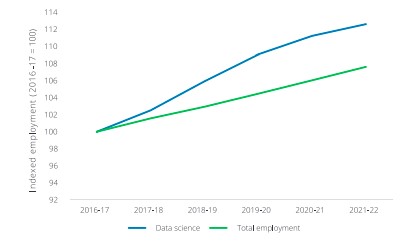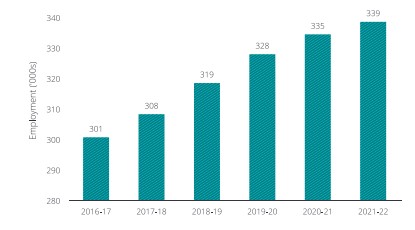
Updated On: 15 October 2025
Occupational and Education trends in Data Science in Australia
Data Science has won the world over, thanks to its wide range of benefits for organizations across industries. As a result of the rapid global growth and adoption of Data Science, the demand for Data Scientists is also increasing unprecedentedly - Australia is no exception. Over the years, there has been significant growth in the availability of data and technology across all parallels of the industry in Australia. This presents a vast scope for Data Science applications in diverse areas of the Australian economy. Employers across various sectors are always creating high demand for professionals with a combination of Data Science skills and industry-specific knowledge. This is further encouraging young aspirants to take up Data Science certifications in Australia. The Australian economy has to offer an extensive range of job opportunities for individuals having Data Science skills. The demand is higher in the technology sector where data analytics and ML (machine learning) techniques lie at the core of the products of tech magnates like Facebook, Google, Netflix, and Amazon. As more companies are integrating data analytics with business operations, the demand for Data Science skills in non-IT areas (agriculture, medicine, finance, and professional services) is also increasing. Furthermore, even research wings and government agencies, Data Science skills are gaining traction, specifically defense and cybersecurity. Ricardo Campello, Professor at James Cook University, states:
Businesses are increasingly demanding technical specialists who are also skilled in ‘business translation’: the ability to understand an organization’s strategy and functions.
Today, organizations of all sizes are leveraging Data Science for myriad reasons, including better insights, data-driven decision-making, increased productivity, and improved customer satisfaction.
Read More: How to Avoid Australia Student Visa Rejection 2025?
Current Occupational and Education trends related to employability in the field of Data Science in Australia
The Deloitte report titled “Occupational and education trends in Data Science in Australia” (2018) maintains that the Data Science workforce in the country is predicted to see significant growth in the coming five years. Apparently, by 2022, the Data Science workforce will witness a much bigger growth than the overall Australian labor force, with employment opportunities growing at an average rate of 1.5% per annum (till 2022).

The Data Science workforce is forecasted to increase from 301,000 professionals (in 2016-17) to 339,000 professionals (in 2021-22) at an average annual growth rate of 2.4% - an increase of around 38,000 workers.

It further maintains that the demand for Software and Applications Programmers will grow by nearly 18,000 professionals at an average annual growth rate of 3% during the forecast period. While the present trends incline more favorably towards the IT sector, dynamic roles like that of Financial Dealers, Intelligence Analysts, and Environmental Scientists are also bound to spike. This promising growth in the demand for Data Science skills and job roles is being driven by the ever-increasing applications of data analytics across various industrial sectors and Australia’s fast-expanding digital economy.
In adherence to the Australian and New Zealand Standard Classification of Occupations (ANZSCO), in IT, the following occupations have tremendous potential for Data Science:
- Database and Systems Administrators
- Information and Communication Technology (ICT) Managers
- ICT Security Specialists
- Actuaries Mathematicians and Statisticians
- Software and Applications Programmers
- Computer Network Professionals
- ICT Business and Systems Analysts
As for non-IT fields, the occupational positions include:
- Financial and Insurance Services Industry: Financial Dealers, Financial Investment Advisors & Managers
- Health Care and Social Assistance: Medical Laboratory Scientists
- Agriculture, Forestry, and Fishing: Agricultural and Forestry Scientists, Environmental Scientists
- Public Administration and Safety Industry: Intelligence and Policy Analysts
- Rental, Hiring and Real Estate Services Industry: Land Economists and Valuers
- Information Media and Telecommunications industry: Advertising and Marketing Professionals
- Professional, Scientific and Technical Services Industry: Economists, Life Scientists, Cartographers and Surveyors, Urban and Regional Planners, Management and Organization Analysts, Geologists and Geophysicists
While the average annual income of Data Science professionals having a postgraduate degree in IT was $111,634 (in 2016-17), it is expected to increase to $130,176 (in 2021-22).
See Also: Part-time Job Opportunities in Australia for International Students
How can upskilling help drive your career in Data Science to the next level?
As data continues to increase, so will the complexities in data processing, analyzing, and managing increase. Coupled with the rapid advancements in technology, this is making it all the more important for Data Science professionals to upskill to keep pace with the evolving technological trends. Since it is challenging to predict what kind of skills will be required in the future, professionals in this field must employ an agile approach in adapting to the evolving trends in the industry. Apart from the foundational skill set needed for Data Science (programming, statistical and mathematical skills, data analysis, data visualization, etc.), one must understand the complete data lifecycle - right from data acquisition, management, and pre-processing of data-to-data analysis and interpretation.
Data holds immense potential to transform businesses/organizations for the better. However, if you wish to unlock the power of data, you must continuously learn about the latest innovations and advancements in technology and Data Science. The best way to do this is by engaging in continual training in Data Science concepts like AI and ML through certification courses. These courses not only introduce you to the world of Data Science, but they also help you strengthen your Data Science skills. You get the opportunity to work on real-world industry projects, get access to online lectures, engage in interactive study sessions, and so much more.
So, what do you say about enrolling in a Data Science Certification course to build a promising career?
You may like: Your 8-Step Guide to Low-Cost Study in Australia
Conclusion
Reach out to SIEC for Application inquiries and assistance.
Read more insightful articles:
Living Cost in Australia in 2025
A Guide to Part-Time Jobs in Major Australian Cities
Life after Graduation in Australia for International Students in 2025



Comments (0)
Leave a Comment